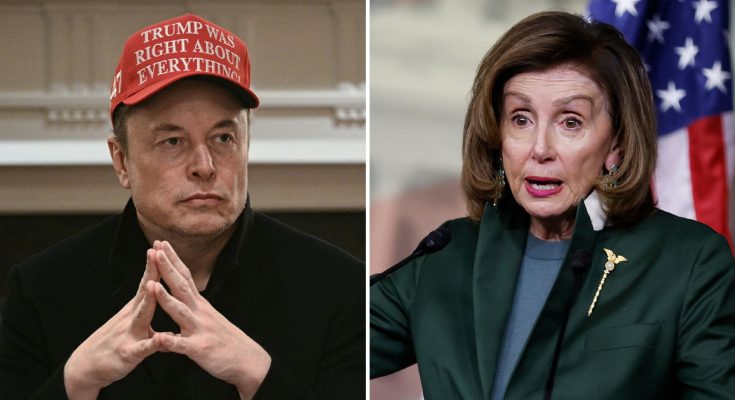The world’s richest man wants answers about how members of Congress have become “strangely wealthy” despite their relatively modest government salaries.
Tesla, Starlink, and SpaceX CEO Elon Musk said his team at the Department of Government Efficiency (DOGE) would look into how certain lawmakers have amassed generational wealth, the New York Post reported.
Musk was responding to a question from an attendee who asked whether DOGE had found any evidence of money transfers from the U.S. Agency for International Development (USAID) to Rep. Maxine Waters (D-Calif.), Sen. Adam Schiff (D-Calif.), and Senate Minority Leader Chuck Schumer (D-N.Y.).
“Yeah, so,” Musk began as he appeared to be organizing his thoughts. “There is a massive amount of corruption, but it is circuitous. So what happens is there’s money that — obviously it’s your taxpayer money — that is then sent to various government organizations who then send it to NGO’s, which an NGO is a non-governmental organization, but obviously it’s a government-funded non-governmental organization.
“It’s just an organization. It’s just a government, and effectively there’s a giant fraud loophole which is that the government can send money to an NGO that is then no longer governed by the laws of the United States,” he continued.
“So they’ll send the money overseas to one NGO, then they’ll go through a bunch of them, and then, I’m highly confident that a bunch of that money then comes back to the United States and lands in the pockets of the people you just mentioned,” he said. “But it is a circuitous route. It doesn’t go directly, but let’s just say that there’s a lot of strangely wealthy members of Congress where I’m trying to connect the dots of, ‘How do they become rich?’”
Dozens of longtime members of Congress have amassed millionaire-level wealth over their careers. Among the richest are former House Speaker Nancy Pelosi (D-Calif.), with an estimated net worth of around $250 million, and Sen. Rick Scott (R-Fla.), whose personal fortune is valued at roughly $552 million, The Post said.
Much of Pelosi’s wealth stems from the successful investments she and her husband, venture capitalist Paul Pelosi, have made in major tech companies such as Apple, Microsoft, Amazon, Google, and Netflix.
Pelosi, in particular, has come under scrutiny for her and her husband’s unusually successful stock trading.
Missouri GOP Sen. Josh Hawley announced plans to reintroduce a bill that would prohibit members of Congress from trading stocks.
“By selling and buying companies that had to do with health care, had to do with vaccines, had to do with medical supplies and masks, multiple of these people were actually investigated by federal agents because it looked so bad. It looked as if it were insider trading. But in fact, it wasn’t technically insider trading. It was just that these members of Congress got briefings and information and then acted on it,” Hawley said.
Hawley said President Donald Trump also supports his bill.
“I think President Trump’s leadership will be key,” said Hawley. “I can tell you, I’m not going to stop pushing on it. When I started on this, people said, ‘Oh, don’t bother. It’ll never pass.’ Well, guess what? We got it through committee for the first time ever with the support of every single Democrat and many, many Republicans. This is something that’s just very hard to vote against, because voters understand there’s no reason for members of Congress to be up here day trading.”
In a 2023 survey conducted by the Program for Public Consultation, 86% of respondents agreed that members of Congress and family members who live with them should be forbidden from trading stocks in particular enterprises. This comprises 87% Republican, 87% Democrat, and 81% Independent.
Approximately 87% of respondents believed that the president, vice president, and Supreme Court judges should be forbidden from trading stocks.
Stock trading remains prevalent in Congress. According to campaign financial disclosure filings from 2023 and 2024, 61% of incoming Congress members owned stock. The Campaign Legal Center claimed that 42 of the 71 new members owned both equities and popularly held investment funds.

